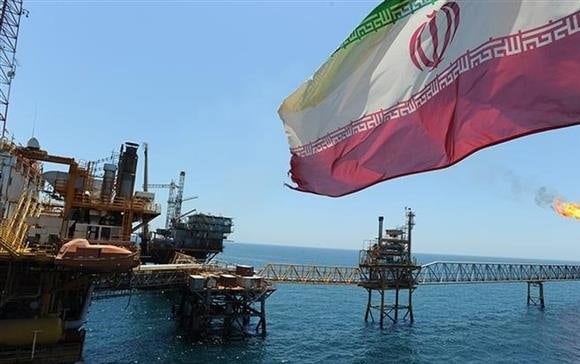President Hassan Rouhani has acknowledged that Iran’s oil revenues, under pressure from comprehensive US sanctions, have fallen by more than 80%.
In a joint video conference with the heads of Parliament and the judiciary on Sunday, Rouhani said income had dropped “from $120 billion in 2011” to “just over $20 billion” last year.
Iran’s oil exports have been slashed by up to 95% since April 2018, with only a few countries such as China making purchases. The Government relies on oil income for about one-third of its budget.
At the end of 2019, the Government forecast a fall of 70% in reveneues, but the decline has been even steeper.
Last week Vice President Mohammad Baqer Nobakht, the head of the Planning and Budget Organization, complained that Iran cannot sell “even a drop of oil” because of sanctions.
First Vice President Eshaq Jahangiri said in June that annual revenue had decreased from $100 billion to about $8 billion in 2019.
Jahangiri proclaimed this spring that the Government could run the country with no oil income. He did not say how sufficient non-oil revenues would be generated.
In the past week, figures have confirmed sharp falls in Iran’s non-oil exports to leading customer China (down 61%); Turkey (75%); India, Japan, and South Korea (more than 95%); and Arab States in the Persian Gulf (60%).
Rouhani implicitly referred to the historic collapse of the Iranian currency. Still, he claimed that, despite the economic problems and recurrent mass protests,, the Iranian people still “trust” the Government.


“By adding gasoline to the “oil products” category, Iran artificially inflated its oil products figure this year — in other words, any supposed increase is not due to actual sales but a redefinition of products”
Er…gasoline is an oil product: https://ec.europa.eu/eurostat/statistics-explained/index.php/Glossary:Petroleum_products
If you knew anything about oil refining, you would know that gasoline is of higher value than other oil products and its manufacture requires denser derivatives to be produced less as a consequence. Iran exports around 10 products, including mazut, diesel and fuel oil in total.
Meanwhile, exports of natural gas are increasing: https://en.mehrnews.com/news/163211/Iran-gas-export-registers-88-jump-in-7-years-NIGC
Rastgoo,
Yes, gasoline is an oil product — but was not counted by Iran as part of its oil product exports until this year. I trust you understand this now.
As for natural gas, you — and Mehr and Iranian officials — neglected to mention that natural gas exports fell almost 40% in 2019.
https://www.ceicdata.com/en/indicator/iran/natural-gas-exports
S.
Meanwhile, in the real world of energy trading, Iran faces no problems selling its oil derivatives: https://en.mehrnews.com/news/163468/8-6mn-tons-of-oil-products-sold-at-IRNEX-in-6-months
“Since the beginning of the current year (March 20, 2020), 8.6 million tons of oil products have been sold at the IRENEX, of which 7.6 million tons have been sold for exports and only one million tons have been consumed domestically.”
Iran can much more easily find buyers for oil products and petrochemicals as they can be sold to a much wider market than crude oil which can be sold only to a handful of refineries. Sanctions are driving Iran to go down the product export rather than the crude export.
“
Rastgoo,
Thanks — there are certain gaps in this all-is-well press release.”
The figure for March 2019-March 2020 is not given to provide a comparison and this from January is relevant:
“Iranian oil products, like its crude, fall under U.S. sanctions, but Tehran has significantly increased exports of gasoil in recent months, to some countries in the region including Iraq and Syria, by offering massive discounts.”
https://www.reuters.com/article/us-iran-oil-products-idUSKBN1ZF1XU
Unsurprisingly, the press release does not mention the price at which the oil products were traded.
S.
Iran exported $1bn in gasoline in the first 5 months of the current Iranian year according to customs officials: https://financialtribune.com/articles/energy/104989/gasoline-exports-rise
Gasoline is a relatively recent addition to the exports of oil products/derivatives. Iran used to be a net importer.
Rastgoo,
You just undermined your own PR. By adding gasoline to the “oil products” category, Iran artificially inflated its oil products figure this year — in other words, any supposed increase is not due to actual sales but a redefinition of products.
S.